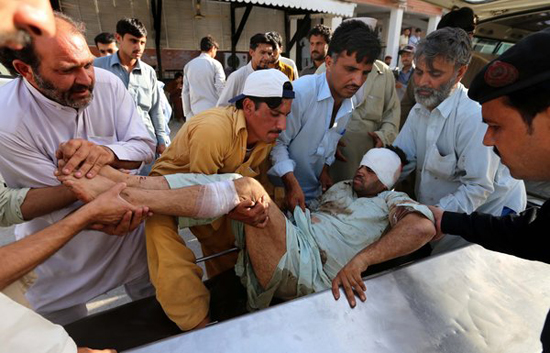PESHAWAR, Pakistan — In what officials called the first major terrorist attack since last week’s general elections, at least 13 people were killed and 30 injured when two bombs ripped through two separate mosques on Friday in a remote mountainous village in northwestern Pakistan.
The twin bombings, triggered by remote-controlled devices, targeted two mosques in Baz Darra village in the Malakand region of the restive Khyber-Pakhtunkhwa Province, said Abdullah Mashal, a senior government official. “Both explosions took place in two mosques, barely 100 feet apart.”
The bombings come at a time when a coalition of political parties, led by Imran Khan, a former cricket captain, is poised to take control of the province, which has been riven by Taliban insurgency. Mr. Khan advocates negotiations with the militants, opposes military operations there and vociferously condemns the use of American drones in the tribal regions of the country.
Mr. Khan’s antiwar message has resonated with residents of the province, who gave his political party, Pakistan Tehreek-e-Insaf, a majority in the provincial assembly in the northwest. But continued violence will pose a major challenge to Mr. Khan and his political allies.
Militant violence will also test the leadership of the incoming prime minister, Nawaz Sharif, the leader of Pakistan Muslim League-N, who is likely to take office by the end of this month after winning a majority in the National Assembly.
Mr. Sharif and Mr. Khan are bitter political rivals but share similar views on how to deal with the militants.
Mr. Sharif has also hinted at being open to negotiations. In the run up to the general elections, the Taliban openly threatened and targeted liberal and secular political parties, damaging their ability to run effective campaigns. The political parties of Mr. Sharif and Mr. Khan were, however, spared such threats. That prompted their political opponents to complain of an uneven political playing field.
Earlier Wednesday, the Pakistani Taliban said they could agree to a cease-fire if the newly elected government took “serious steps” ahead of the negotiations, but the group stopped short of identifying exactly what it was seeking.
On Thursday, Taliban fighters assaulted a military convoy on the outskirts of provincial capital of Peshawar, killing five soldiers and wounding another five.
The soldiers from the army’s engineering unit were on their way from the southern Bannu district to Peshawar when they were fired at, said a security official, who spoke on condition of anonymity as required by protocol. “This is what militants do to reciprocate the talk offer,” the official said bitterly.
There was no claim of responsibility for the Friday bombings, and officials struggled to understand the reasons behind the attacks. Malakand is a mountainous region where militants held sway before 2009, when the military carried out an operation and claimed to have pushed the militants out.
“We have not observed any militant activity in the area since then. It has been peaceful, and the nationwide elections held on Saturday last were peaceful. So, we have no idea why and who carried out the twin attacks,” Mr. Mashal said.
Most of the casualties occurred in the first explosion during the Friday sermon. “The roof collapsed, and many of the wounded had to be pulled out after removing the debris,” Mr. Mashal said.
People in the nearby mosque were alerted by the loud explosion, and most of them had already vacated the building when the second bombing struck. The mosque was badly damaged. “Luckily, there were no casualties. Just one boy got wounded,” Mr. Mashal said.
“When we heard the explosion, we rushed to the mosque and heard wounded people crying for help,” said a local resident, declining to be identified publicly.
The wounded were ferried to nearby towns for treatment.
“I was offering my prayers when the explosion took place,” said a wounded young man in the hospital at Batkhela, a town in Malakand where several of the wounded were hospitalized. “What happened afterwards and how I ended up here in hospital, I don’t remember.”
Ismail Khan reported from Peshawar and Salman Masood from Islamabad, Pakistan.


